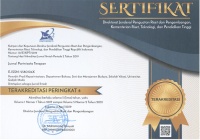Analysis of Sidoakur Tourism Village Development, Sleman Regency Using the Community-Based Tourism Concept
Ahmad Syahrial Semendawai(1*)
(1) Gadjah Mada University
(*) Corresponding Author
Abstract
Special region of Yogyakarta has a diversity of objects as well as a variety and unique character. One of the tourism that is being intensively developed is a tourism village which is commanded by the local community or also called community-based tourism. Tourism Village is one of the means of solving the economic development of rural communities. However, in its development not all tourist villages can be successful, some have declined and even vacuumed.
This study focuses on one of the tourism villages in Sleman Regency, namely Desa Wisata Sidoakur. The purpose of this study is to analyze the causes of the decline in activities and visits in terms of the dynamics of development and implementation of the principles of community-based tourism. The research method used is descriptive qualitative method with a geographical unit of analysis, namely Sidoakur Tourism Village. In this study, data were collected by means of observation, interviews and documentation. While the determination of informants using purposive and snowball techniques.
The results of the study indicate the cause of the decline in tourism villages activities. The first factor is the difference in views between the new hamlet and the tourism village manager. Second, less transparent management has implications for decreasing community participation. Third, the absence of youth involvement in tourism management has an impact on the regeneration of tourism village managers.
Keywords
Full Text:
PDFReferences
Anonim. (2016). Kajian Klasifikasi Desa Wisata Kabupaten Sleman. Dinas Pariwisata Kabupaten Sleman.
Anonim. (2018). Kajian Klasifikasi Desa Wisata Kabupaten Sleman. Dinas Pariwisata Kabupaten Sleman.
Butler, R W. (1980). The Concept of a Tourist Area Life Cycle of Evolution: Implications for Management of Resources. Canadian Geographer, XXIV (1), 5-12.
Damanik, Janianton. (2013). Pariwisata Indonesia Antara Peluang dan Tantangan. Yogyakarta: Pustaka Pelajar.
Damanik, J., Wijayanti, A., & Nugraha, A. (2018). Perkembangan siklus Hidup Destinasi Pariwisata di Indonesia. Nasional Pariwisata, 10(1), 1–13.
Dolezal, C., & Novelli, M. (2020). Power in community-based tourism: empowerment and partnership in Bali. Journal of Sustainable Tourism, 0(0), 1–19. https://doi.org/10.1080/09669582.2020.1838527
Demartoto, Argyo. (2009). Pembangunan Pariwisata Berbasis Masyarakat. Surakarta: Sebelas Maret Press.
Firdaus, Syahran. (2018). Fenomena Elite Capture dalam Pengelolaan Badan Usaha Milik Desa (BUMDes): Studi kasus strategi bekerjanya kekuasaan elite dalam pengelolaan BUMDes Argosari, desa Pulosari, Kabupaten Pemalang. Jurnal Ilmu Politik, 9(2), 20-37.
Hadiwijoyo, Suryo Sakti. (2012). Perencanaan Pengembangan Desa Wisata Berbasis Masyarakat.Yogyakarta: Suluh Media.
Iskandar. (2009). Metodologi Penelitian Kualitatif dan Kuantitatif. Jakarta: GP Press
Lay, Cornelis. (2006). Involusi politik. Yogyakarta: Polgov.
Moleong, Lexy J. (1999). Metodologi Penelitian Kualitatif. Bandung: Remaja Rosdakarya.
Nurhidayati, Sri Endah dan Chafid Fandeli. (2012). Penerapan Prinsip Community Based Tourism (CBT) Dalam Pengembangan Agrowisata Di Kota Batu, Jawa Timur. Jurnal Jejaring Administrasi Publik, IV (1), 36-46.
Patilima, Hamid. (2007). Metode Penelitian Kualitatif. Bandung: Alfabeta.
Pitana, I Gede dan Gayatri. (2005). Sosiologi Pariwisata. Yogyakarta: Andi Offset.
Pitana, I Gede dan I Ketut Surya Diarta. (2009). Pengantar Ilmu Pariwisata. Yogyakarta: Andi Offset.
Potjana, S. (2003). Community Based Tourism Handbook. Thailand, Responsible Ecological Social Tour-Rest: Mild Publishing. Rest Project: Thailand.
Purbasari, Novia dan Asnawi. (2014). Keberhasilan Community Based Tourism di Desa Wisata Kembangarum, Pentingsari dan Nglanggeran. Jurnal Teknik PWK Universitas Diponegoro, 3(3) 560-568.
Raharjana, D. T., & Putra, H. S. A. (2020). Penguatan SDM dalam e-Marketing untuk Promosi Desa Wisata di Kabupaten Malang. Jurnal Nasional Pariwisata, 12(2), 140. https://doi.org/10.22146/jnp.60403
Sim, Arief Armand et al. (2017). Ketimpangan, Elite Capture, dan Penargetan Program Perlindungan Sosial: Bukti dari Indonesia: Smeru Reserach Institute.
Sudaryanto, Agus. (2018). Nilai-Nilai Kearifan Lokal Yang Diterapkan dalam Pengelolaan Tanah Pariwisata Sri Gethuk di Bleberan, Playen, Gunung Kidul. Jurnal Mimbar Hukum Universitas Gadjah Mada. 30(1), 78-93.
Sugiyono. (2015). Metode Penelitian Kuantitatif. Kualitatif dan R&D. Bandung: Alfabeta.
Sunaryo, Bambang. (2013). Kebijakan Pembangunan Destinasi Pariwisata Konsep dan Aplikasinya di Indonesia. Yogyakarta: Gava Media.
Tosun C, (1999). Towards a typology of community participation in the tourism development Process, International Journal of Tourism and Hospitality,10:113-134.
Article Metrics
Refbacks
- There are currently no refbacks.
Copyright (c) 2022 Ahmad Syahrial Semendawai

This work is licensed under a Creative Commons Attribution-ShareAlike 4.0 International License.













